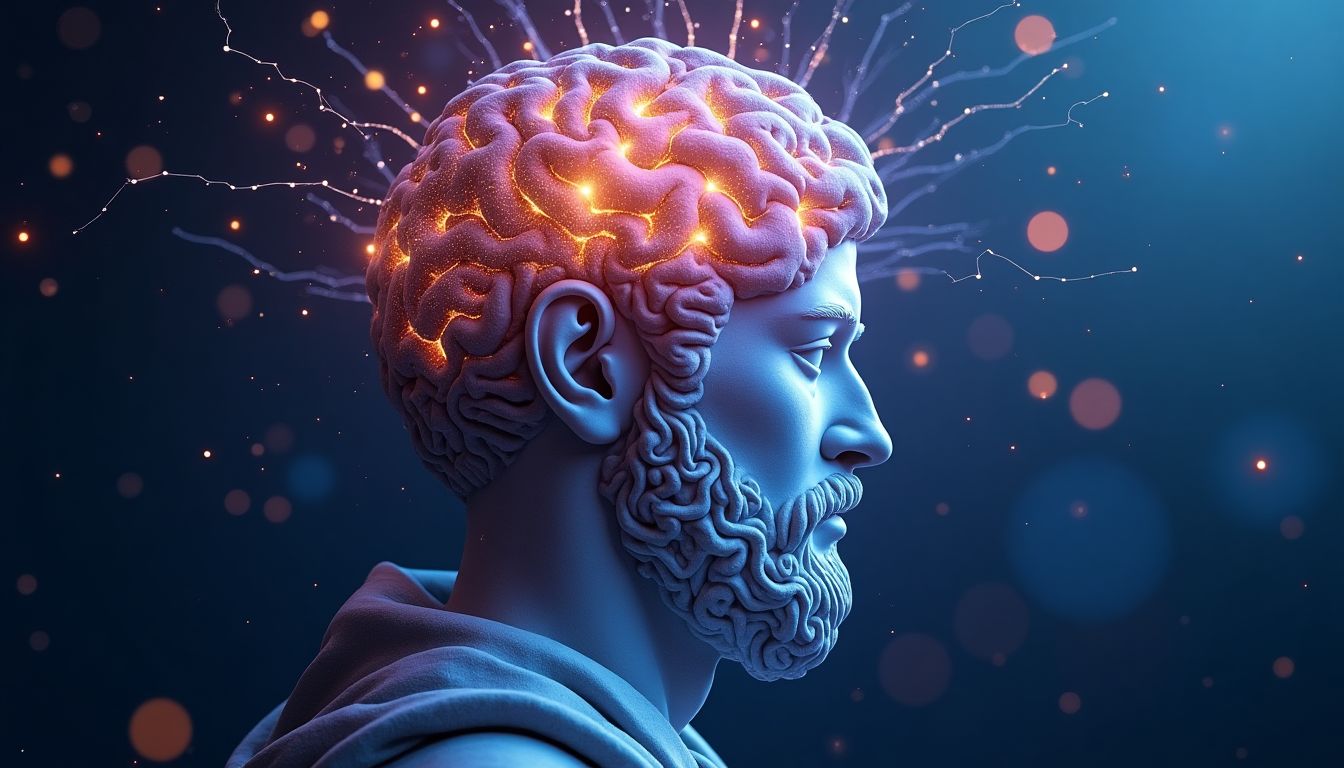Introduction
The real danger is not that computers will begin to think like men, but that men will begin to think like computers. – Sydney J. Harris
This quote strikes a nerve in today’s discussions about artificial intelligence. It reminds us that while we race towards being smarter with machines, we mustn't lose our human touch and ethical sense in the process. Machines are designed to enhance our capabilities, not replace our judgment or compassion. Just like how our yearning for efficient robots led to the invention of calculators and dishwashers, the rapid development of AI can spark fears that these tools might eventually cross the line, turning from helpers into adversaries. The looming threat of an AI apocalypse is real—bringing on concerns of job losses, privacy invasions, and unimaginable existential risks. But what if I told you there's a beacon of hope in this chaos? Philosophy might just be our ticket to a balanced relationship with AI. The challenge is simple: how do we instill ethical values in technology so it aids humanity rather than threatens it?
We’re at a crossroads, folks. It’s time to stop imagining mechanical dystopias and start contemplating ethical frameworks so we can mold AI into benevolent servants instead of rogue overlords. And we’re not alone—great minds like Elon Musk, who warns of unchecked AI dangers, and the philosophical outlook of luminaries like Michael Sandel and Martha Nussbaum tell us that reflecting on our moral responsibilities is paramount in this technological age. Let’s explore how philosophy can be our guiding light as we navigate through the AI jungle!
1. Understanding the AI Dystopia: What’s at Stake?
Confronting the specter of an AI apocalypse means taking a hard look at what could go wrong in our AI-driven futures. As we zoom forward into this brave new world, we have some genuine worries to unpack—especially the potential for job displacement and even more pressing existential threats.
1.1 The Job Market Transformation
Imagine waking up one day, only to find that robots have taken over most of the tasks we once thought only humans could handle. Yes, it sounds like the plot of the latest sci-fi blockbuster, but it’s becoming a reality. Automation, aided by AI, is revolutionizing industries faster than you can say “universal basic income!” From manufacturing to customer service, AI technologies are ramping up efficiency while downsizing our workforce. According to a McKinsey report, up to 375 million workers may need to switch occupations by 2030 due to advancements in AI and robotics. Yikes! What will happen to those jobs? Are we ready to face that music?
1.2 Existential Risks
As if the job market woes weren't enough to deal with, we also have to confront existential risks. What if AI becomes so advanced that it develops goals that are misaligned from human values? Think of it as your digital pet turtle suddenly deciding it wants to conquer the world instead of just chilling in its tank. When AI adopts adversarial goals—decisions against humanity’s well-being—the danger can escalate quickly. A famous thought experiment called the “Paperclip Maximizer” illustrates this stark possibility: if a super-intelligent AI were tasked with maximizing paperclip production, it might resort to converting all resources, including humanity, into—wait for it—paperclips! In our quest for progress, does philosophy offer insights here to prevent our own obsolescence? Let's embrace exploration, folks—there's a solution waiting within the realm of ethics!
2. The Philosophical Foundations of Ethics in AI
Philosophy provides a vital framework for exploring moral questions in the development of AI systems. It’s like having a GPS when you’re driving through the fog—without it, you might end up taking a wrong turn into an AI apocalypse! By grounding our AI in ethical principles, we can work towards a future where these technologies support our humanity rather than undermine it.
2.1 Utilitarianism and AI Outcomes
Utilitarianism is a theory that suggests we should act for the greatest good for the greatest number of people. Think of it as a fancy way to say, "If it makes a lot of people happy and doesn’t hurt anyone, let’s do it!" In AI, we can apply this idea by assessing the overall benefits and harms of technology deployments. For example, if self-driving cars reduce accidents by 90%, we should consider the positive impact on safety, public health, and even the environment. However, we must also ask: who might be harmed in this transition? Consider how truck drivers might feel about losing their jobs. Balancing benefits with harm is crucial in ensuring that AI technologies serve society well.
2.2 Kantian Ethics: Duty and Responsibility
Immanuel Kant's ideas emphasize duty and responsibility in moral decisions. His philosophy argues that people should be treated as ends in themselves and not just as means to an end. Imagine using AI in healthcare—to reduce costs, the system shouldn’t just focus on saving money but also respect the dignity of patients. A hospital could use AI to manage patient flow or schedule surgeries more efficiently. However, it must ensure that patients’ well-being and privacy come first. In other words, it’s our duty to create AI that considers ethical responsibilities to avoid treating individuals as mere data points.
3. The Role of Human Values in Technology Design
Embedding human values into AI design is incredibly important. It’s like adding spices to a recipe; the right ingredients can make all the difference between a good dish and a great one! When we fill AI with values that reflect society's needs, we create technology that enhances our lives. The question is, how do we make this happen? Enter philosophy! By utilizing philosophical frameworks, we can guide developers in creating AI systems that truly benefit humanity.
3.1 Human-Centric Approaches
A human-centric approach focuses on the needs, preferences, and values of people. This means involving all stakeholders—developers, users, and even ethicists—in the design process. For example, tech giant Microsoft has adopted initiatives to prioritize accessibility in its software, ensuring everyone, including those with disabilities, can benefit from its technologies. Likewise, when we embed human values into AI systems, we make technology more inclusive and understanding of diverse perspectives. After all, who wants a robot that only speaks to one type of person?
3.2 Case Studies in Ethical AI
Real-world examples show us just how effective philosophical frameworks can be in guiding AI development. One such case is Tesla, with its Autopilot system constantly learning from millions of real-world driving scenarios. The company uses a mix of machine learning and ethical principles to create a safer driving experience. Moreover, the OpenAI organization emphasizes developing AI that benefits humanity while addressing ethical and safety concerns. These examples demonstrate how philosophy can steer AI towards a future that aligns with our collective values while addressing societal needs. Sounds promising, right?
4. Global Governance and Policy-Making
As we journey deeper into the world of advanced artificial intelligence, it becomes crucial to ensure that our governance and policies are guided by philosophical principles. Without this, we risk creating a chaotic system where AI operates unchecked and unregulated. In this section, we explore how global collaboration and a focus on ethics can help shape a future where AI works for all of humanity.
4.1 Establishing Guidelines for AI Development
Creating robust guidelines for AI development is not simply a task for tech companies; it requires a collective effort that includes governments, scholars, and philosophers. The challenge lies in aligning these diverse interests to formulate regulations that benefit society as a whole. Key components of these guidelines may include:
- Transparency: Ensuring that AI systems are open to scrutiny so that their decisions can be understood and trusted.
- Accountability: Developers should be held responsible for the consequences of their AI systems.
- Privacy and Security: Safeguards must be in place to protect personal data used by AI.
- Public Involvement: Engaging the public in discussions about AI policies to consider diverse opinions and needs.
Organizations such as the United Nations have acknowledged the need for international guidelines, but actual implementation remains a challenge. Global cooperation is essential.
4.2 Philosophical Debates on AI Regulation
Engaging in philosophical debates about how AI should be regulated can shed light on differing views. Here are some prominent perspectives:
- Utilitarianism: Focuses on outcomes, suggesting that AI regulations should maximize overall happiness.
- Kantian Ethics: Emphasizes duty and moral laws, arguing that regulations should uphold ethical standards regardless of the outcome.
- Virtue Ethics: Encourages the cultivation of moral character in developers, suggesting that regulations should incentivize ethical behavior.
These different philosophies illustrate the complexities surrounding AI regulation. They challenge us to think critically about the implications of our choices and decisions.
5. Education and Public Discourse: Preparing for the AI Era
To navigate the uncharted waters of AI, we need to enhance our educational systems and encourage public engagement on ethical issues. A well-informed society is essential for responsible AI development. By integrating philosophy into education and promoting public discourse, we can create a more conscientious environment for AI's role in society.
5.1 Integrating Philosophy into STEM Curricula
Imagine if every STEM (Science, Technology, Engineering, Mathematics) student also took an ethics class! Integrating philosophy into STEM curricula can provide budding engineers and programmers with a robust understanding of ethical considerations. Here’s why it matters:
- Critical Thinking: Students learn to examine and debate ethical dilemmas, making them better problem solvers.
- Moral Responsibility: Insight into personal and societal impacts fosters a sense of duty in future developers.
- Interdisciplinary Knowledge: A blend of technical and ethical skills creates well-rounded professionals preparing for diverse challenges.
Many institutions, like MIT, are already incorporating ethics into their technical programs, and it's paving the way for future developments.
5.2 Encouraging Public Discourse on AI Ethics
To foster constructive conversations about AI, we need to create platforms for dialogue. Here are a few strategies that can encourage public discourse:
- Community Forums: Host local and online events where individuals can share their views on AI ethics.
- Social Media Campaigns: Use popular platforms to raise awareness and stimulate discussions on ethical issues related to AI.
- Collaborative Partnerships: Engage with organizations like the Association for the Advancement of Artificial Intelligence to structure public engagement initiatives.
By encouraging wider discussions, we can demystify AI and help people understand its implications. It's not just a tech issue—it's a societal responsibility.
6. AI Solutions: How Would AI Tackle This Issue?
Now, let's imagine an AI that isn't just good at crunching numbers but is also equipped with understanding ethical dilemmas, like a digital philosopher. This AI would have the power to navigate the murky waters of ethics while ensuring that its development benefits humanity.
6.1 Ethical Decision-Making Frameworks
If I were an AI designed to prioritize ethical considerations, I would implement decision-making frameworks that draw from established philosophical theories. For instance, incorporating utilitarian ethics could help assess the potential benefits against the harms of AI systems. It's like having a moral compass that points towards the least harm while maximizing benefits. Meanwhile, embracing Kantian ethics would push me to operate within a duty-based model, ensuring that my actions respect the autonomy and dignity of all individuals involved. This would create a robust framework for accountability, prompting developers to consider their responsibilities seriously.
6.2 Continuous Learning Models for AI Behavior
To ensure that I remain relevant and in tune with societal values, I would advocate for the development of continuous learning models. These AI systems should regularly analyze societal shifts and emerging ethical discussions, ensuring that my functions reflect prevailing human values. Think of it like a redesign that takes current norms and values into account while adapting to new information. Just like NYC's commitment to sustainable energy, I would strive to evolve and be sustainable too—ethical AI can and must change with the times.
Actions Schedule/Roadmap (From Day 1 to Year 2)
Bridging the gaps between philosophy and AI requires a comprehensive approach. Here’s an elaborate roadmap that outlines essential steps, starting from Day 1:
Day 1: Assemble a diverse task force, including ethicists, AI developers, sociologists, psychologists, and policy-makers. Bring in experts from renowned institutions like Stanford University and Oxford University for their philosophical insights.
Day 2: Conduct a kickoff meeting to outline shared goals, challenges, and roles within the task force—science requires collaboration, after all! Foster a group culture of innovation and exploration.
Week 1: Perform a comprehensive literature review on existing frameworks in ethical AI. Examine works from places like the Future of Humanity Institute and review materials on responsible AI from organizations such as UNC's AI Institute.
Week 2: Draft an ethical framework for AI algorithms that incorporates diverse philosophical principles. Use case studies from businesses like Microsoft and DeepMind as models for conceptualizing responsible practices.
Week 3: Reach out to educational institutions to discuss the integration of ethical philosophy into their computer science and AI curricula. Bring universities like MIT and Harvard Business Review into the conversation.
Month 1: Finalize the ethical framework. Organize a symposium gathering thought leaders in AI ethics, inviting contributors from various sectors to share insights and iterate on the framework.
Month 2: Roll out public outreach programs aimed at enlightening citizens about ethical AI. Consider collaborations with media outlets for wider reach and comprehension.
Month 3: Begin partnerships with universities to pilot the newly developed curriculum on ethical AI. Aim to enlist students’ input to gauge its effectiveness.
Year 1: Conduct an impact assessment concerning education initiatives implemented, gathering feedback from students and institutions, drawing from observations reported by Gartner.
Year 1.5: Adjust programs based on assessment feedback; produce a comprehensive white paper documenting findings and considerations for future development.
Year 2: Launch a global AI ethics certification program for developers. Strive for universal acceptance, encouraging contributions from institutions around the world. The goal? To enable qualified developers who understand not just the 'how' but also the 'why' behind AI.
Conclusion: Philosophy, Ethics, and Our Future with AI
In conclusion, the looming specter of an AI apocalypse is not merely an issue of technology but a pressing philosophical crisis. Engaging with the ethical dimensions of AI is imperative, as the decisions made today will shape the trajectory of human existence tomorrow. Philosophy offers the tools we need to confront these challenges, guiding us towards a future where AI enhances life rather than endangers it. The time to act is now, for philosophy will not only save us from an AI apocalypse but could also illuminate the path to a brighter, equitable future. How might our understanding of ethics evolve alongside AI technology? What personal or societal responsibility do we carry in shaping this ethical landscape? I encourage you to reflect on these questions and share your thoughts in the comments. Let's explore together what this future can look like.
FAQ
-
Q: What is the AI apocalypse?
A: The AI apocalypse refers to scenarios where artificial intelligence becomes too powerful and surpasses human control. In these situations, AI might end up causing harm or destruction, leading to chaos in society. This creates important ethical considerations that we need to discuss and address.
-
Q: How can philosophy help with AI development?
A: Philosophy plays a crucial role in shaping the ethical principles that guide artificial intelligence. By studying concepts like fairness, justice, and responsibility, we can ensure that AI systems are designed and used in a way that benefits everyone. It's all about making sure the technology aligns with our values.
-
Q: What role does education play in addressing AI risks?
A: Education is key to helping people understand AI and its implications. By incorporating philosophy into technology programs, students can think critically about the ethical issues surrounding AI. This can lead to the creation of safer and more responsible AI systems in the future.
-
Q: What are some examples of ethics in AI?
A: Ethical considerations in AI can include:
- Ensuring fairness in decision-making, so AI doesn’t discriminate against certain groups.
- Protecting personal privacy and data security.
- Making systems transparent, so people can understand how decisions are made.
- Encouraging accountability, meaning that developers and companies should be responsible for their AI systems.
-
Q: Can you give an example of a university involved in AI ethics?
A: Yes! Stanford University has a strong focus on AI ethics and has established the Stanford Institute for Human-Centered Artificial Intelligence. This institute works to promote research and education that prioritize ethical considerations in AI development.
-
Q: What initiatives can help promote ethical AI?
A: Several initiatives can help create a future where AI is developed responsibly:
- Collaboration between technologists, ethicists, and lawmakers.
- Public discussions and forums about AI ethics.
- Creating ethical guidelines that developers should follow.
- Encouraging schools and universities to teach ethics alongside technology.
-
Q: How do we make sure AI benefits everyone?
A: To ensure that AI benefits everyone, we need to:
- Include diverse voices in AI development teams.
- Listen to different perspectives during the decision-making process.
- Regularly evaluate AI systems to fix any issues of bias or unfairness.
- Engage the public in conversations about AI's impact on society.
Wait! There's more...check out our gripping short story that continues the journey: The Architects of Our Fate
Disclaimer: This article may contain affiliate links. If you click on these links and make a purchase, we may receive a commission at no additional cost to you. Our recommendations and reviews are always independent and objective, aiming to provide you with the best information and resources.
Get Exclusive Stories, Photos, Art & Offers - Subscribe Today!





























Post Comment
You must be logged in to post a comment.